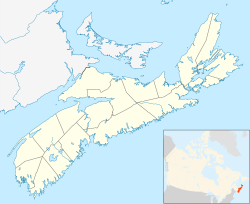Weymouth Falls | |
|---|---|
Community | |
| Coordinates: 44°24′13″N65°56′38″W / 44.40361°N 65.94389°W | |
| Country | Canada |
| Province | Nova Scotia |
| Municipality | Digby County |
| Time zone | UTC−4 (AST) |
| • Summer (DST) | UTC−3 (ADT) |
| GNBC Code | CBOMG [1] |
Weymouth Falls is a Black Nova Scotian settlement within the District of Clare in Digby County, located in the Canadian province of Nova Scotia.



